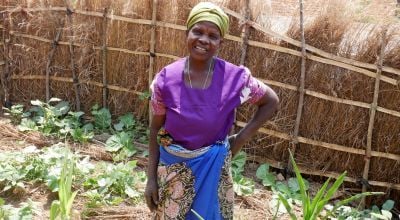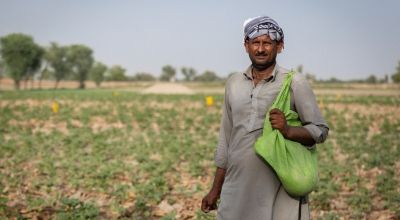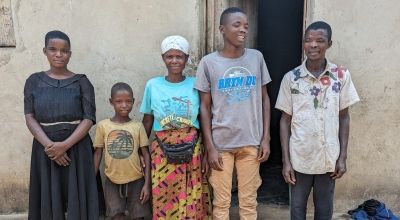
Read our 2023 annual report

Knowledge Hub
In rural parts of Rwanda, almost one person in every five lives in extreme poverty. Breaking free from that cycle is a huge challenge.
But for many people who have partnered with us on our groundbreaking Graduation Programme, the new skills they have acquired have enabled them to do just that - escape poverty and earn a living to sustain their families.
Once stuck in a desperate daily struggle to survive, many of them have now established flourishing and sustainable livelihoods. Highly motivated and focused, they are making the most of the training and funding provided to start up successful small-scale businesses, helping their families to thrive.
We’d like you to meet them.
1. Alexia, the tailor
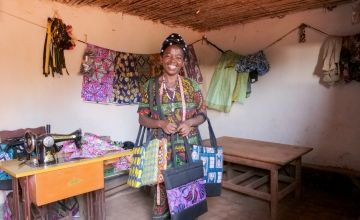
Alexia Mukashyaka (40) is proud of the brightly coloured fabric bags she has carefully and expertly made. After investing in a sewing machine, the mum-of-three started a successful tailoring business in a small workshop in her village, thanks to skills training and support from Concern.
She produces 20 women’s outfits on average a week, as well as bags and men’s shirts, and also mends clothes in need of repair.
I chose sewing because it’s a skill that doesn't age and it’s a good way to earn a living... The business makes money every minute and every hour.
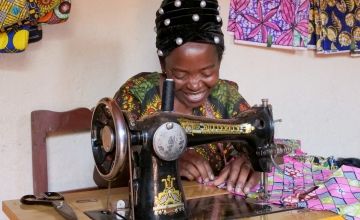
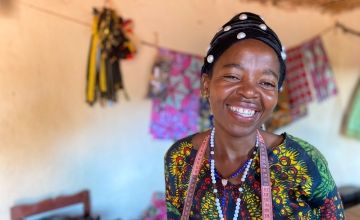
She said: "Before, life was bad. I was really poor. I would take a hoe and go and farm for someone for a wage to take care of my children. But now, life is easy. Whenever I get work, I do it and then I save some money to take care of my children, no problem at all."
Alexia plans to expand her business and eventually open a hairdressing salon. She is currently receiving lessons on hair styling, and hopes her 12-year-old daughter will join her in her future salon business.
"I'm paying someone to teach me how to do hairdressing with the money I’m earning... I can get a steady stream of clients for hairdressing," she explained. "This place is small. If I have enough, I will go and look for a bigger place and bring all the materials that I need and work in that larger space. I would have the salon in one part and then another part for tailoring."
2. Marie-Claire, the grain seller
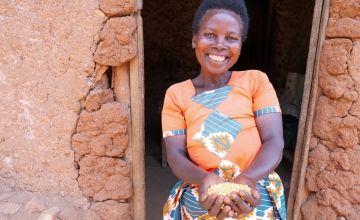
Mum-of-five Marie-Claire Ayinkamiye (45) is an astute and hard-working businesswoman, using skills acquired from the Graduation Programme to sell grains and legumes to customers in her hillside village.
She explained: "I buy and sell rice at the market and store it here. Neighbours come and buy it from me. That's how I make money."
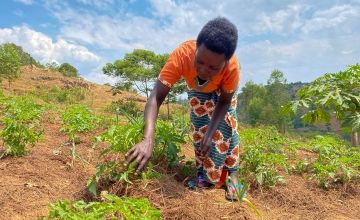
It is a big change from struggling to earn a living as a casual farm labourer cultivating other people’s land.
Inside a storeroom in her house, Marie-Claire inspects her supplies of rice, sorghum and soya beans, some of which she harvested on two plots that she owns. She also grows tomatoes and onions, as well as papaya trees which she planted from saplings. All of that makes for a profitable trade.
I'm going places, I'm no longer poor like before... I didn't have any livestock but now I have. I didn't have food, but now you can see the sorghum, rice and soya beans. I’m strong now. It's not like before. I used to go and farm for someone else and they would give me a cup of beans. I would cook some and keep the rest to plant.

Marie-Claire has also purchased a bike which her grown-up children use to transport supplies to and from the market, 10 kilometres away.
She said she no longer has “sleepless nights thinking about what tomorrow will look like": "I will keep on working so that my business grows."
3. Jean de Dieu, the shop owner
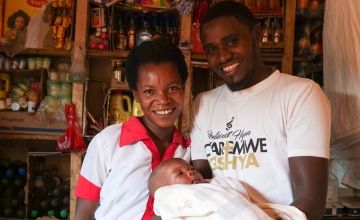
Father-of-two Jean de Dieu Nsanzumuhire (29) is a busy man. Not only does he have the added responsibility of helping to care for his newborn daughter, who entered the world three months ago, he also runs a successful small grocery shop in his community.
Over the past two years, Jean de Dieu and his wife Riberi have transformed their lives after taking part in Concern’s Graduation Programme.
"Life was not easy. We only ate once a day," he said. "Before this project, we didn't have a plot on which to grow beans. Finding food was not easy. Getting money was hard because I only earned [a little] each day to buy food for my family. When my wife was pregnant with our first child, it was not easy. But now, we eat three meals daily. Now, things are going well."
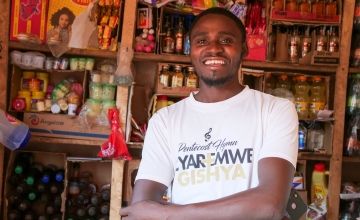
Today, Jean de Dieu’s shop is a vital part of the community, with everything from eggs, salt and cooking oil to soap and toothpaste on offer to local people who would otherwise have to travel long distances for such provisions. He has made enough from the business to invest in five plots of land where he cultivates rice and has planted trees.
When I put my skills together with the training and advice I received, it helped me. They told us whatever we achieve…we should invest more in what we have. I also face that in my daily work and I remember these things that I’ve learned.
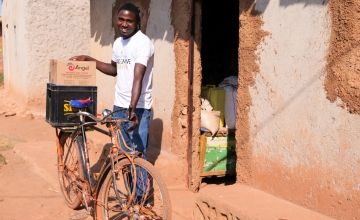
After originally buying a bike to help transport goods to and from his shop, Jean de Dieu now plans to purchase a motorbike to make life easier.
4. Charlotte and Joel, the farmer and carpenter
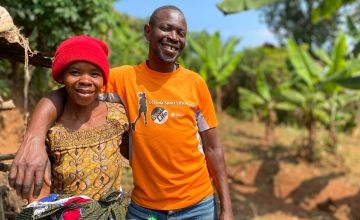
It all changed for Charlotte Bankundiye (33) and husband Joel Nkurunziza (37) when they received financial support to build their own house together. Before that, they and their two children were living with relatives or sleeping in the open.
Once they had a place of their own, Charlotte and Joel invested in livestock, and set up a prolific kitchen garden growing amaranth and onions. They now rent land to grow potatoes, cassava and beans, selling any surplus harvest at market.
The neighbours can testify about how this project has made an impact. We are happy. Sometimes, I could scream when I think about having a house now and not having to sleep outside. The neighbours say I’m crazy because of my happiness.
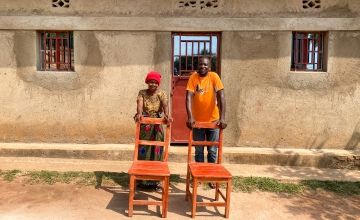
On top of that, Joel is attending vocational training in carpentry and has already made two chairs and a door.
He said: "There have been a lot of good changes. Before, I had to find work, but now I can pay for a worker to go to the plot when I'm not there. In years to come, I will send five workers. The livestock will have increased. And I will have gained lots of skills from the vocational training. Because I'm learning. I'm putting all my strength into studying."
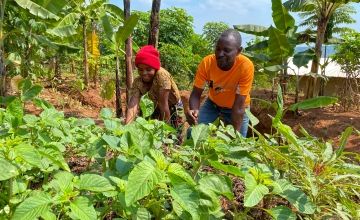
5. Emmanuel, the banana seller
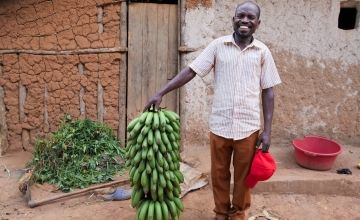
Emmanuel Habimana (43) and wife Delphine Hagenimana (35) have three children, including a newborn son. They were both casual farm labourers and found it difficult to make ends meet every day. But after receiving a grant and business training from Concern, they turned a small banana plantation into a money-making business.
“The banana plantation supports my life here,” said Emmanuel, who recently harvested 40 kilos of the fruit to sell at market.
From the proceeds, the family have been able to invest in livestock, including goats and a cow, and they make additional money from selling the aubergines and cabbages they grow in their kitchen garden, along with beans for themselves.
You struggle a lot living in a village. But when you have something like a banana plantation, you can sell bananas... and buy what the children need. That’s a big change. Now that we are growing beans, we will survive here in the village.
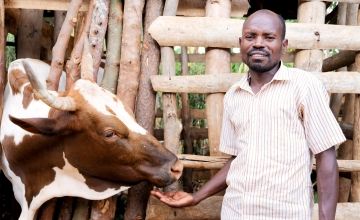
The small business also means Emmanuel and Delphine are now able to keep their two older children in school.
"Before I got the support, being able to afford school meals was very difficult," Emmanuel explained. "We struggled to pay for them and also to afford food at home. Now, the difference is that it is easy to pay for school meals. There’s no issue. Health-wise, there’s a difference in the children’s appearance."
Other ways to help
Corporate support
Is your company interested in working together for a common cause?
Fundraise for Concern
From mountain trekking to marathon running, cake sales to table quizzes, there are lots of ways you can support our work.
Buy a gift
With an extensive range of alternative gifts, we have something to suit everybody.
Leave a gift in your will
Leave the world a better place with a life-changing legacy.
Volunteer with Concern
The lots of ways to get involved with our work as a volunteer
School fundraising
Without the generous support from schools, we wouldn't be able to do the work that we do.


